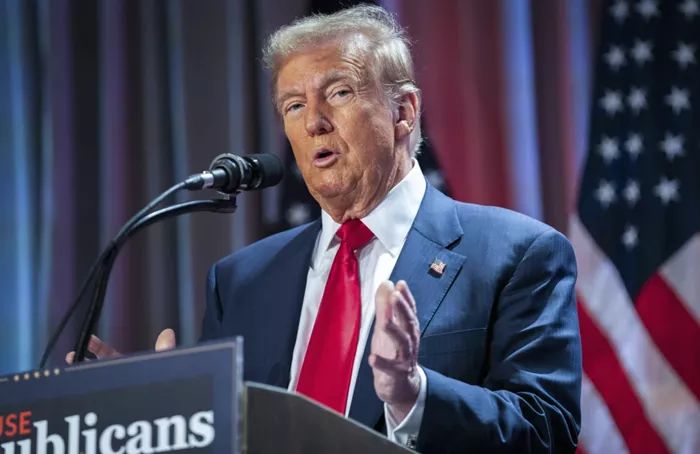WEST PALM BEACH, Fla. (AP) — President-elect Donald Trump declared a victory in his efforts to curb illegal immigration from Mexico on Wednesday, following a conversation with Mexican President Claudia Sheinbaum. However, Sheinbaum suggested that Mexico was already doing its part and had no interest in closing its borders.
The two leaders spoke just days after Trump threatened to impose new tariffs on Canada and Mexico as part of his plan to address illegal immigration and the flow of drugs into the U.S. Trump claimed that Sheinbaum had agreed to “stop migration through Mexico,” but the Mexican president countered that Mexico is already “taking care of” migrant caravans, describing the conversation as “excellent.”
In a statement on social media, Sheinbaum emphasized that Mexico’s position is not to close its borders but to build stronger bridges of cooperation between governments and people. She further explained that Mexico is working to manage migrant caravans and prevent them from reaching the U.S. border.
While the fate of the proposed tariffs remains unclear, Trump posted on Truth Social that the discussions with Sheinbaum were a step toward “effectively closing our southern border.” He referred to the conversation as “very productive.”
Trump’s threat of tariffs appears to have reinforced his belief in the effectiveness of using trade disruptions as a policy tool. Even if the tariffs do not materialize, the mere possibility of them can be leveraged as a bargaining chip to strengthen his stance on immigration.
Sheinbaum confirmed on social media that the leaders had also discussed Mexico’s approach to managing migration. She explained that the migrant caravans were not reaching the U.S. border because Mexico was addressing the issue within its own borders.
The two leaders also discussed increased cooperation on security matters, with Sheinbaum highlighting Mexico’s efforts to combat fentanyl trafficking. She noted that the country is focused on reducing the consumption of the powerful opioid, which has been increasingly mixed into illicit drug supplies.
Illegal migration across the U.S.-Mexico border has decreased in recent months, partly due to Mexico’s stepped-up enforcement efforts. According to U.S. officials, the number of arrivals has dropped by 40% since December, largely due to Mexico’s efforts to monitor rail yards and highway checkpoints.
Mexican authorities have also been rounding up migrants and sending them to the country’s southern regions in an attempt to slow their progress toward the U.S. border, a strategy that has been credited with dissuading many migrants from continuing their journey.
The status of the proposed tariffs remains uncertain. If implemented, they could increase consumer prices and slow economic growth, potentially undermining the U.S.-Canada-Mexico trade agreement established in 2020 during Trump’s first term.
In addition to the tariffs on Canada and Mexico, Trump announced plans for a 10% tariff on Chinese goods linked to fentanyl production. He has also expressed plans for a large-scale advertising campaign to raise awareness about the dangers of fentanyl use.
Through September of this year, the U.S. has imported $378.9 billion in goods from Mexico, $322.2 billion from China, and $309.3 billion from Canada.
Related topics:
- ICE Considers Major Expansion of Immigrant Detention in New Jersey, Eyeing 600 New Beds
- Vermont’s Immigrant Farm Workers Fear for Their Future Amid Trump’s Mass Deportation Threat
- Immigrants’ Frustration with New Arrivals Fuels Trump’s Surge in Latino Support


